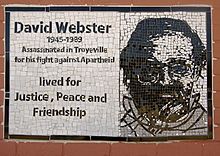David Webster (anthropologist)

David Joseph Webster (born December 19, 1945 in Luanshya , Northern Rhodesia , † May 1, 1989 in Johannesburg ) was a South African social anthropologist . He was an opponent of apartheid and was murdered by covert units of the South African government.
Life
Webster was born in 1945 in Luanshya in what was then Northern Rhodesia (now Zambia ), where his father worked as a miner in the Copperbelt . He studied at Rhodes University in Grahamstown , South Africa , where he became politically active for the first time when he and fellow students protested against the exclusion of black spectators from a rugby game .
1970 Webster was as a lecturer for anthropology at the Witwatersrand University appointed. His doctoral thesis was an investigation of family relationships in southern Mozambique , but he increasingly included politically sensitive aspects in his research, such as the problems of migrant work and the social causes of tuberculosis and malnutrition . From 1976 he taught and researched for two years at the University of Manchester in the United Kingdom . He then returned to the Witwatersrand University.
In the 1980s, Webster was particularly involved in the South African Detainees 'Parents' Support Committee (about: Support Committee for the Parents of Imprisoned), which stood up for the many people who were imprisoned without trial. It was triggered by the arrest of some of his students, including Barbara Hogan, who was a member of the ANC Minister from 2008 to 2010 . He was also a member of the opposition movement United Democratic Front and was involved in the Free the Children Campaign and the Running Shoes Campaign, in which, for example, the signed running shoes Johnny Cleggs were given to political prisoners. Clegg had studied with Webster and became a lecturer himself, but then began a successful music career. In 1983, Webster co-founded the End Conscription Campaign , which campaigned for the abolition of conscription in South Africa.
Webster's research focused on analyzing the growing oppression and violence in South Africa. Shortly before his murder, he conducted research in the Kosi Bay area in what was then Natal , which was then a secret training area for covert government units. He wrote a posthumous report about it in June 1989 and the Chronicle of a death foretold. David Webster writes on the South African death squads was called (German about: Chronicle of an announced death. David Webster writes about the South African death squads).
Webster was shot dead outside his home in the Troyeville district of Johannesburg on May Day 1989 by a member of the Civil Cooperation Bureau , an undercover unit of the South African Defense Force . About 10,000 people attended Webster's funeral at St. Mary's Anglican Cathedral in Johannesburg.
consequences
The South African Truth and Reconciliation Commission (TRC), founded after the end of apartheid , dealt with Webster's death and wrote a special report on his murder.
In 1998, the South African Ferdinand Barnard was sentenced to two life imprisonment plus another long term for his murder and other crimes. An amnesty within the framework of the negotiations of the TRC was rejected in 2001, a request for clemency in 2009. In April 2019, Barnard was released on parole.
Honors
In 1992, a Witwatersrand University dorm was named the David Webster Hall of Residence . In 2009 a park in Troyeville got its name. Webster's former partner Maggie Friedman, Johnny Clegg and Barbara Hogan took part in the renaming ceremony.
Works
- 1989: Repression and the State of Emergency June 1987 – March 1989. Ravan Press, Johannesburg (with Maggie Friedman)
- 1989: Chronicle of a death foretold: David Webster writes on the South African death squads (article). Africa Watch Committee, Washington DC 1989
literature
- Julie Frederikse: David Webster. Maskew Miller Longman, Cape Town 1998
- Deborah James: David Webster: An activist anthropologist twenty years on. LSE Research Online, London 2009, PDF
Web links
- David Webster at sahistory.org.za (English)
- Report on Webster occasion of naming a park after him (English)
- Obituary by Edward Eddie Webster (colleague at Witwatersrand University) in Transformation , 9/1989 (PDF file, English; 85 kB)
- Obituary by Lloyd Vogelman, 1990 (English)
Individual evidence
- ↑ David Webster at sahistory.org.za , accessed November 4, 2011
- ↑ a b c d Website of the City of Johannesburg ( Memento from May 15, 2016 in the Internet Archive ) (English)
- ^ Library entry , accessed on November 4, 2011
- ↑ Deborah James: David Webster: An activist anthropologist twenty years on. LSE Research Online, London 2009 (English, PDF file; 143 kB), accessed on November 6, 2011
- ↑ Entry at worldcat.org (English), accessed on November 5, 2011
- ↑ Website of the Center for the study of violence and reconciliation , accessed on November 4, 2011
- ^ Apartheid-era killer Ferdinand Barnard released on parole. News24, April 2, 2019.
- ↑ Entry at worldcat.org (English), accessed on November 5, 2011
| personal data | |
|---|---|
| SURNAME | Webster, David |
| ALTERNATIVE NAMES | Webster, David Joseph (full name) |
| BRIEF DESCRIPTION | South African anthropologist |
| DATE OF BIRTH | December 19, 1945 |
| PLACE OF BIRTH | Luanshya |
| DATE OF DEATH | May 1, 1989 |
| Place of death | Johannesburg |
